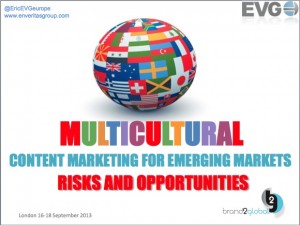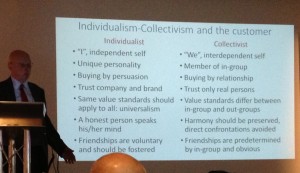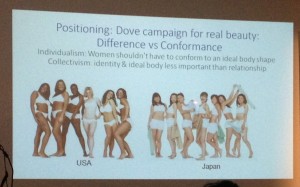Brand2Global: Cultural Differences and Big Data
 Eric Ingrand will be presenting at Brand2Global Conference in London at 11:30 am on Wednesday, September 18, 2013. The topic is: Multicultural Content Marketing for Emerging Markets: Risks and Opportunities.
Eric Ingrand will be presenting at Brand2Global Conference in London at 11:30 am on Wednesday, September 18, 2013. The topic is: Multicultural Content Marketing for Emerging Markets: Risks and Opportunities.
Localization, SEO and content marketing are merging – and both brands and B2B organizations now realize they need all three to remain relevant in today’s highly competitive world. That’s one insight I’ve drawn from the Brand2Global Conference in London happening September 16–18, 2013.
It’s about time. At EnVeritas, we have been advising clients to blend SEO, localization, content creation, social media and content management for years. It’s only recently, as a result of Google’s Panda and Penguin algorithm updates, that traditional SEO companies have started realizing how essential content marketing is to success in the online marketplace.
And it’s only recently that brands have woken up to the potential for expanding their markets internationally through targeted localization and multilingual content marketing.
A conference for global marketers
The conference is presented by an experienced team of US-based localization professionals led by Nitish Singh, Ph.D., of the Boeing Institute of International Business at Saint Louis University.
The focus is not so much on localization technology but on the globalization of marketing activities: global branding, marketing campaigns, websites and social media.
Understanding cultural differences
Geert Hofstede, an influential Dutch researcher in organizational culture, cultural economics and management, opened the conference with a keynote speech that got everyone thinking.

One of Geert’s insights focused on “studying the social world…the ability to relate to tangible facts and to predict actual behavior.” This is similar to what marketers call Big Data. Careful statistical analysis can help marketers understand their target cultures, thereby allowing them to create the right content, for the right audience, at the right time.
This is key to success in global marketing, and it’s the reason I’m sitting at the Brand2Global conference.
Consumer perspectives and cultural differences are another issue for marketers when creating and distributing content. For Geert, each consumer is different. However, “consumer orientations do share their society’s culture.” This leads him to a conclusion with which we at EVG are fully in agreement:
“Few brands can be sold by a fully standardized approach, but many through a categorized approach.”
 Geert’s books have been localized in 20 languages, and all multicultural content marketers and localization professionals can benefit from his insights. Check out my Twitter feed to see some of his slides on cultural differences and individualist versus collectivist cultures.
Geert’s books have been localized in 20 languages, and all multicultural content marketers and localization professionals can benefit from his insights. Check out my Twitter feed to see some of his slides on cultural differences and individualist versus collectivist cultures.
KLM’s success in multicultural content marketing
Calijn Roeters van lennep, E-development Manager at KLM, presented on the airline’s successful use of multicultural content marketing and social media in its ecommerce operations.
KLM realizes that: “We have to know our customer and know when to be relevant at the right time to let customer satisfaction grow.” This, according to Calijn, is achieved thanks to social media and quality content creation adapted to multiple cultures.
How do you measure the effectiveness of content? Many brands might link it directly to ticket sales. But according to KLM, it’s customer satisfaction which drives revenues and which is therefore the key indicator of success.
Social media 24/7
Listening and reacting to customer wishes is also important for KLM. This is partly achieved through social media. Currently there is 24/7 social media support in nine languages, with the aim of responding to a customer concern within one hour and resolving it within one day.
The fact that calls to the call center dropped when the social media program was launched confirms that social media is now the preferred support channel for a growing percentage of the brand’s customer base. Says Calijn:
Social media is really changing the way our company stands in front of our customers.
Big data drives content strategy
One of the challenges faced by KLM is how to make each customer journey consistent and equally good. Smart analysis of data from website users, social media, and focus groups can help to achieve this. At EVG, we have been advising our clients on how to do this for years. It is great to see our approach backed up by such a large and successful company.
KLM uses the data to define personas that exemplify their customer base both culturally and emotionally. This allows them to empathize more easily with customers and to respond to the fear that travel instills in some travelers.
Innovate and engage
Data analysis also helps the company to test innovations before rolling them out. Among recent innovations is a new and more inspirational booking engine, designed in response to customer demands and feedback.

Another interesting path taken by KLM is gamification. The Aviation Empire game will capture a user’s attention for 15 minutes, which is an increasingly difficult feat in a world of short attention spans. Games can not only keep users entertained, but engage them in the company’s growing community.



